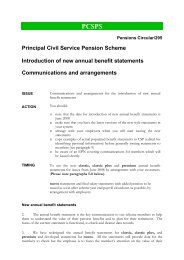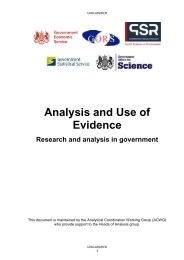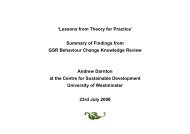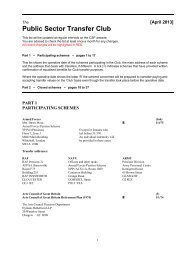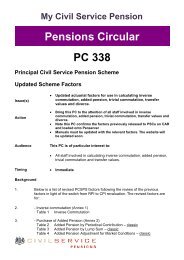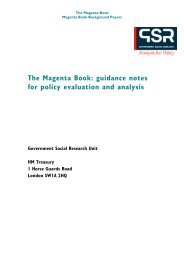Ethical assurance for social research In government - The Civil Service
Ethical assurance for social research In government - The Civil Service
Ethical assurance for social research In government - The Civil Service
Create successful ePaper yourself
Turn your PDF publications into a flip-book with our unique Google optimized e-Paper software.
Government Social Research Unit<br />
GSR Professional Guidance<br />
<strong>Ethical</strong> Assurance <strong>for</strong> Social Research in Government<br />
Issued September 2005, updated May 2008
<strong>Ethical</strong> Assurance <strong>for</strong> Social Research in Government<br />
GSR Guidance<br />
This guidance note is one of a series produced by GSRU. Other titles are:<br />
1. Government Social Research Competency Framework; July 2005<br />
2. GSR Professional Guidance: Procurement of Government Social Research; February<br />
2006<br />
3. GSR Professional Guidance: Release Protocol <strong>for</strong> Government Social Research (in<br />
press).<br />
<strong>The</strong>y can be downloaded from the GSR website on www.gsr.gov.uk<br />
- 2 -
<strong>Ethical</strong> Assurance <strong>for</strong> Social Research in Government<br />
Contents<br />
Foreword ................................................................................................................. 4<br />
1. <strong>In</strong>troduction and Summary ............................................................................. 5<br />
2. <strong>Ethical</strong> Responsibilities................................................................................... 8<br />
Principle 1: Sound application and conduct of <strong>social</strong> <strong>research</strong> methods, and<br />
interpretation of the findings ............................................................................... 8<br />
Principle 2: Participation based on in<strong>for</strong>med consent ......................................... 9<br />
Principle 3: Enabling participation..................................................................... 11<br />
Principle 4: Avoidance of personal and <strong>social</strong> harm ......................................... 11<br />
Principle 5: Non disclosure of identity............................................................... 13<br />
3. Departmental governance arrangements .................................................... 14<br />
Departmental Ethics Sponsors ......................................................................... 15<br />
Assessing and Managing Risk.......................................................................... 15<br />
Sanctions and redress...................................................................................... 19<br />
4. <strong>The</strong> Government Social Research Unit’s Role & Responsibilities ............ 20<br />
Appendix A: Links to other sources of ethical guidance ................................. 21<br />
Appendix B: Legal Context .................................................................................. 23<br />
- 3 -
<strong>Ethical</strong> Assurance <strong>for</strong> Social Research in Government<br />
Foreword<br />
<strong>The</strong> purpose of this document is to set out the key principles which should be<br />
upheld in the conduct of <strong>social</strong> <strong>research</strong> <strong>for</strong> <strong>government</strong>. <strong>The</strong> principles reflect<br />
the standards accepted by the wider profession, but take particular account of the<br />
responsibilities of those conducting <strong>social</strong> <strong>research</strong> <strong>for</strong> <strong>government</strong>.<br />
Part One summarises the content; Part Two sets out the principles and Part<br />
Three addresses governance arrangements to safeguard adherence to the<br />
principles. All <strong>social</strong> <strong>research</strong> conducted <strong>for</strong> <strong>government</strong> should adhere to the<br />
principles. <strong>The</strong> precise governance arrangements to ensure <strong>government</strong> <strong>social</strong><br />
<strong>research</strong> upholds the principles are a matter <strong>for</strong> individual departments, but they<br />
should be clearly set out and responsibility <strong>for</strong> oversight should be clearly<br />
assigned to named individual(s) or nominated post(s). Part Three sets out good<br />
practice governance arrangements designed to ensure the principles are upheld;<br />
alternative arrangements which achieve the same end are also acceptable. <strong>The</strong><br />
procedures in place should address the particular risks faced by individual<br />
departments in commissioning and conducting <strong>social</strong> <strong>research</strong>; these may differ<br />
depending on policy area and customer base.<br />
This is the first in a series of GSR Professional Guidance notes; copies can be<br />
downloaded from the GSR website at www.gsr.gov.uk<br />
Paul Wiles<br />
Head of Government Social Research <strong>Service</strong><br />
- 4 -
<strong>Ethical</strong> Assurance <strong>for</strong> Social Research in Government<br />
1. <strong>In</strong>troduction and Summary<br />
1.1. Social science <strong>research</strong> may involve participants or subjects directly as<br />
the source of primary data, or indirectly via access to secondary data<br />
already secured. <strong>The</strong>re is a need to ensure that <strong>research</strong>ers attend to all<br />
ethical issues and principles relating to the potential risks of the <strong>research</strong><br />
to all involved 1 . All members of the Government Social Research (GSR)<br />
service, and others with responsibility <strong>for</strong> commissioning <strong>social</strong> <strong>research</strong><br />
on behalf of <strong>government</strong>, must be aware of and uphold basic ethical<br />
responsibilities (as well as their legal obligations) throughout the life of<br />
any <strong>research</strong> project conducted or commissioned <strong>for</strong> <strong>government</strong>.<br />
1.2. <strong>The</strong> Government Social Research Unit (GSRU) has reviewed existing<br />
arrangements to manage the conduct of ethical review in departments and<br />
has also consulted other funders, who are similarly seeking to ensure<br />
<strong>research</strong> they fund is conducted ethically. This guidance on the ethical<br />
<strong>assurance</strong> of <strong>government</strong> <strong>social</strong> <strong>research</strong> both draws upon, and is aligned<br />
with, this body of knowledge – especially the Economic and Social<br />
Research Council (ESRC)’s Research Ethics Framework; the Social<br />
Research Association (SRA)’s <strong>Ethical</strong> Guidelines; and the MRS’s Code of<br />
Conduct. <strong>The</strong> guidance is also consistent with the values contained within<br />
the <strong>Civil</strong> <strong>Service</strong> Code.<br />
1.3. <strong>The</strong> guidance:<br />
• summarises the key principles which those commissioning or<br />
conducting <strong>social</strong> <strong>research</strong> <strong>for</strong> <strong>government</strong>, whether members of the<br />
Government Social Research service or not, need to uphold<br />
• sets out the responsibilities of departments in developing governance<br />
procedures <strong>for</strong> use in central <strong>government</strong><br />
• clarifies the future role <strong>for</strong> the Government Social Research Unit in<br />
maintaining appropriate ethical standards.<br />
1.4. All staff commissioning or conducting <strong>social</strong> <strong>research</strong> <strong>for</strong> <strong>government</strong> have<br />
a responsibility to uphold five key ethical principles:<br />
• Principle 1: Sound application and conduct of <strong>social</strong> <strong>research</strong> methods<br />
and appropriate dissemination and utilisation of the findings<br />
• Principle 2: Participation based on valid in<strong>for</strong>med consent<br />
• Principle 3: Enabling participation<br />
1 This would include: <strong>research</strong> subjects and any wider <strong>social</strong> groups or organisations they may represent,<br />
the <strong>research</strong>ers themselves, their employing organisations and funding agencies.<br />
- 5 -
<strong>Ethical</strong> Assurance <strong>for</strong> Social Research in Government<br />
• Principle 4: Avoidance of personal and <strong>social</strong> harm<br />
• Principle 5: Non-disclosure of identity and personal in<strong>for</strong>mation.<br />
Responsibilities of departments<br />
1.5. It is the responsibility of individual <strong>government</strong> departments to put in place<br />
suitable systems and processes to ensure that appropriate ethical<br />
standards are met. <strong>In</strong> particular, <strong>government</strong> departments have a<br />
responsibility to ensure that <strong>for</strong> all <strong>research</strong> projects they conduct or<br />
commission:<br />
• systems are in place to assess, throughout the life of the project: the<br />
appropriateness of proposed <strong>research</strong> methods; the ability and<br />
capacity of contractors to undertake the <strong>research</strong> to appropriate quality<br />
standards; the anticipated risk to <strong>research</strong>ers and participants at the<br />
outset of the project; and unanticipated ethical problems which emerge<br />
during the project. Systems and protocols will need to be<br />
reviewed/audited on a regular basis to ensure they continue to be fit<br />
<strong>for</strong> purpose;<br />
• the importance of good ethical practice is set out in departmental<br />
skills/competency frameworks, and that training/development needs<br />
<strong>for</strong> individual staff are identified and met to ensure that staff are aware<br />
of and can implement their ethical responsibilities; and<br />
• appropriate management and quality <strong>assurance</strong> arrangements are in<br />
place <strong>for</strong> ensuring in-house <strong>research</strong> is conducted ethically including<br />
systems <strong>for</strong> monitoring and responding to complaints <strong>for</strong> both internal<br />
and external projects.<br />
1.6 <strong>In</strong>dividual staff responsible <strong>for</strong> conducting or managing <strong>social</strong> <strong>research</strong> <strong>for</strong><br />
<strong>government</strong> must ensure they are aware of their ethical responsibilities,<br />
and of any local (departmental) protocols on how to put these into<br />
practice. Those commissioning <strong>research</strong> need to ensure that the potential<br />
ethical issues presented by a project are assessed at the outset, that<br />
appropriate arrangements <strong>for</strong> ethical scrutiny are in place; and that the<br />
organisation undertaking the <strong>research</strong> has appropriate arrangements in<br />
place to ensure the day-to-day management of these risks. Those<br />
conducting <strong>research</strong> (including secondary analysis) must additionally<br />
ensure they comply with the department’s arrangements <strong>for</strong> management<br />
and quality <strong>assurance</strong>.<br />
- 6 -
<strong>Ethical</strong> Assurance <strong>for</strong> Social Research in Government<br />
Support from the Government Social Research Unit<br />
1.7 <strong>The</strong> Government Social Research Unit will provide the following to support<br />
individuals and departments in meeting their obligations:<br />
• Keep the guidance under review, to ensure it is kept up-to-date.<br />
• Keep a watching brief on ethical developments and provide ad hoc<br />
advice on specific ethics issues emerging in departments, including<br />
facilitating sharing of in<strong>for</strong>mation on difficult cases and their resolution.<br />
• Support departments in sharing good practice and promote<br />
consistency in the development of local protocols, and supporting<br />
pro<strong>for</strong>ma.<br />
• Ensure competencies within the GSR Competency Framework<br />
incorporate ethical standards.<br />
• Provide training <strong>for</strong> GSR staff to help them develop ethical expertise.<br />
- 7 -
<strong>Ethical</strong> Assurance <strong>for</strong> Social Research in Government<br />
2. <strong>Ethical</strong> Responsibilities<br />
2.1. It is important that <strong>government</strong>-sponsored <strong>research</strong> practice facilitates<br />
general acceptance and understanding of <strong>research</strong> processes and so<br />
enables rather than hinders future <strong>research</strong>. Those conducting,<br />
commissioning or managing <strong>government</strong> <strong>social</strong> <strong>research</strong> have a<br />
responsibility to ensure that <strong>research</strong> is conducted using appropriate<br />
methods and that the rights and interests of all those involved in the<br />
<strong>research</strong> process are protected. Government <strong>social</strong> <strong>research</strong> should be<br />
conducted in a manner that:<br />
• ensures valid, in<strong>for</strong>med consent is obtained be<strong>for</strong>e individuals<br />
participate in <strong>research</strong><br />
• takes reasonable steps to identify and remove barriers to participation<br />
• avoids personal and <strong>social</strong> harm<br />
• protects the confidentiality of in<strong>for</strong>mation about <strong>research</strong> participants<br />
and their identities.<br />
All processes should also protect against distortion and bias in the<br />
interpretation of findings.<br />
2.2. Commissioners of <strong>social</strong> <strong>research</strong> <strong>for</strong> <strong>government</strong> should ensure that<br />
these principles, together with legal obligations 2 are upheld when<br />
designing and conducting <strong>research</strong> studies. Departments are responsible<br />
<strong>for</strong> putting in place arrangements to ensure this happens. Where projects<br />
are externally commissioned, it is the <strong>research</strong> manager’s responsibility to<br />
check that ethical issues have been identified, and that the contracted<br />
organisation(s) have suitable arrangements <strong>for</strong> addressing them and<br />
keeping them under review as appropriate over the life of the project.<br />
Principle 1: Sound application and conduct of <strong>social</strong> <strong>research</strong> methods,<br />
and interpretation of the findings<br />
2.3 Social <strong>research</strong> conducted by or <strong>for</strong> <strong>government</strong> should be based on<br />
sound <strong>research</strong> methods that are appropriate to the <strong>research</strong> question and<br />
carried out to the highest standards of quality. Social <strong>research</strong> conducted<br />
by or <strong>for</strong> <strong>government</strong> should aim to meet a clearly defined, legitimate and<br />
unmet need to in<strong>for</strong>m the conduct of <strong>government</strong> business. Those<br />
responsible <strong>for</strong> conducting or commissioning <strong>government</strong> <strong>social</strong> <strong>research</strong><br />
2 <strong>The</strong> main relevant legislation is summarised in Appendix B, but legal advice should always be sought if<br />
there is any uncertainty regarding legal rights and obligations.<br />
- 8 -
<strong>Ethical</strong> Assurance <strong>for</strong> Social Research in Government<br />
should avoid placing an unnecessary burden on respondents. <strong>The</strong><br />
evidence emerging from <strong>government</strong> sponsored <strong>social</strong> <strong>research</strong> should be<br />
brought to the attention of policy makers and other users in a way that is<br />
clear and accessible, as well as con<strong>for</strong>ming to professional and ethical<br />
standards to protect against distortion and bias in the interpretation of<br />
findings.<br />
Principle 2: Participation based on in<strong>for</strong>med consent<br />
2.4 Participants in any <strong>research</strong> study involving primary data collection must<br />
be asked <strong>for</strong> their consent to take part unless the law requires<br />
participation, as with the Census. <strong>In</strong> other cases, it should be clear that<br />
participation is voluntary and that they have the right to refuse to answer<br />
individual questions or to withdraw from the <strong>research</strong> process at any point,<br />
<strong>for</strong> whatever reason. Potential participants should not in any way feel<br />
pressurised to take part in <strong>social</strong> <strong>research</strong> 3 . <strong>The</strong>y must be given sufficient<br />
in<strong>for</strong>mation to enable them to make an in<strong>for</strong>med decision. Participants’<br />
agreement should also be sought be<strong>for</strong>e equipment (such as a video or a<br />
tape recorder) is used. <strong>In</strong> some contexts, additional consent may need to<br />
be obtained after the completion of <strong>research</strong> fieldwork if, <strong>for</strong> example,<br />
presentation of raw data is necessary and warranted at a conference, or if<br />
additional <strong>research</strong> is to be conducted that goes beyond the use <strong>for</strong> which<br />
in<strong>for</strong>med consent was given. Covert <strong>research</strong> raises particular ethical and<br />
legal concerns and should be approached very carefully. Where covert<br />
<strong>research</strong> is planned it must be subjected to rigorous independent ethical<br />
review, and legal advice should be sought be<strong>for</strong>e it is conducted.<br />
2.5 Consent may need to be renegotiated where respondents are being reinterviewed,<br />
and <strong>research</strong>ers must disclose the source of the original<br />
sample if respondents request this. Special considerations apply to<br />
interviewing children and vulnerable adults who may not have capacity to<br />
give valid, in<strong>for</strong>med consent.<br />
2.6 <strong>The</strong> <strong>In</strong><strong>for</strong>mation Commissioner advises, in relation to obtaining consent <strong>for</strong><br />
the purposes of the Data Protection Act 1998, that there should be some<br />
active indication that consent has been given. As a minimum, <strong>research</strong>ers<br />
must ensure that they can demonstrate that they have fully in<strong>for</strong>med<br />
potential respondents about the nature and purpose of the study, that<br />
3 Given concerns about declining response rates, many <strong>research</strong> organisations are<br />
understandably firming up their activities at initial contact, to maximise response rates by<br />
converting potential non-responses into interviews. Those responsible <strong>for</strong> commissioning or<br />
undertaking <strong>research</strong> on behalf of <strong>government</strong> need to satisfy themselves that these activities do<br />
not leave potential participants feeling pressurised.<br />
- 9 -
<strong>Ethical</strong> Assurance <strong>for</strong> Social Research in Government<br />
consent is voluntary, and that they can withdraw at any time. One method<br />
of achieving this is through leaflets. Researchers should also consider<br />
whether written evidence of consent is appropriate. Participants may<br />
request that their personal data be destroyed and may in some cases<br />
have the right to have it destroyed, under the Data Protection Act 1998.<br />
Participants may also request copies of <strong>research</strong> data relating to them via<br />
Subject Access Requests under the Data Protection Act 1998, or a<br />
request under the Freedom of <strong>In</strong><strong>for</strong>mation Act, 2000.<br />
2.7 Secondary data analysis, including systematic reviews and <strong>research</strong><br />
synthesis, must be conducted in a way that is consistent with the<br />
respondent consent given in the original study.<br />
2.8 If individuals choose to take part in <strong>research</strong>, their consent should be<br />
freely given. Any in<strong>for</strong>mation likely to affect a respondent’s willingness to<br />
participate should be provided. Participants should be neither<br />
overwhelmed nor inadequately in<strong>for</strong>med. Relevant in<strong>for</strong>mation includes<br />
the purpose and nature of the <strong>research</strong>, who is undertaking it, who the<br />
sponsor is, and plans <strong>for</strong> dissemination/feedback. Participants should be<br />
in<strong>for</strong>med of any features which might particularly affect them. Any<br />
consequences of participation should also be explained. Written<br />
in<strong>for</strong>mation that is intended <strong>for</strong> participants’ use should be produced in<br />
‘plain English’ and in an appropriate font size (size 14+ <strong>for</strong> those with<br />
visual difficulties). Where relevant, potential participants should also have<br />
access to material produced in minority ethnic languages, Braille or on<br />
audiocassette.<br />
Consent via gatekeepers or proxy<br />
2.9 Where possible, participants should be approached directly <strong>for</strong> consent.<br />
Consent should only be accepted from a gatekeeper or proxy after a<br />
reasonable attempt has been made to explain to the intended participant<br />
the purposes and implications of the <strong>research</strong>, and to secure his/her<br />
consent directly. When negotiating consent via gatekeepers or proxies,<br />
reasonable care should be taken to safeguard the relationship between<br />
gatekeeper/proxy and participant and protect the participant’s privacy.<br />
Children<br />
2.10. Legally, the age at which a child has capacity to consent will depend on<br />
the circumstances. For <strong>government</strong> sponsored <strong>research</strong>, parents or<br />
legal guardians must be approached <strong>for</strong> consent <strong>for</strong> children aged under<br />
16 to participate in <strong>research</strong>. <strong>In</strong> addition to parental consent, reasonable<br />
ef<strong>for</strong>ts must be made to in<strong>for</strong>m children under 16 about the purpose of<br />
- 10 -
<strong>Ethical</strong> Assurance <strong>for</strong> Social Research in Government<br />
the <strong>research</strong> and seek their consent to participate. Children under the<br />
age of 16 should be accompanied during interviews.<br />
2.11 Children who are 16 or over will usually be able to give their own consent<br />
but even where this is so, <strong>research</strong>ers should consider whether it is also<br />
appropriate <strong>for</strong> parents, guardians or other appropriate gatekeepers (e.g.<br />
schools) to be in<strong>for</strong>med when their child has been invited to participate in<br />
<strong>research</strong>.<br />
Principle 3: Enabling participation<br />
2.12 <strong>The</strong> potential impact of choices in <strong>research</strong> design (such as sample<br />
design, data collection method and so on) on participation should be<br />
considered. <strong>In</strong> particular, the effect of <strong>research</strong> design on such groups as<br />
ethnic minorities, those with caring responsibilities, and those with<br />
physical or mental impairment should be considered. Consideration<br />
should be given to issues likely to act as a barrier to participation, and<br />
reasonable steps taken to address these. Possible measures include:<br />
• Assistance with costs incurred in <strong>research</strong> participation: - e.g. help<br />
with childcare, or transport costs etc.<br />
• Provision of services: e.g. transport to and from the venue <strong>for</strong> those<br />
with accessibility/mobility problems; provision of interpretation<br />
facilities/<strong>for</strong>eign language interviews; induction loops <strong>for</strong> those with<br />
hearing impairment etc.<br />
• Methods of data collection: e.g. offering a choice between self<br />
completion and interviewer assisted interviewing in projects where<br />
respondents have difficulty reading or comprehending written material.<br />
• Sample design: e.g. considering the implications of excluding sparsely<br />
populated areas in highly clustered sample designs; and considering<br />
the case <strong>for</strong> over-sampling under-represented or hard-to-reach<br />
groups.<br />
• User-involvement: e.g. consulting hard-to-reach groups and/or their<br />
representatives on <strong>research</strong> design to ensure that possible barriers to<br />
participation are identified and minimised.<br />
Principle 4: Avoidance of personal and <strong>social</strong> harm<br />
2.13 <strong>In</strong>dividual <strong>research</strong> subjects 4 (and the wider <strong>social</strong> groups or<br />
organisations to which they belong) and <strong>research</strong>ers should have their<br />
4 <strong>In</strong>cluding those who opt out.<br />
- 11 -
<strong>Ethical</strong> Assurance <strong>for</strong> Social Research in Government<br />
physical, <strong>social</strong> and psychological well-being protected at all stages of the<br />
<strong>research</strong> process. A <strong>research</strong> participant may feel wronged if: the<br />
<strong>research</strong> is inappropriately intrusive (in terms of method, relevance to the<br />
<strong>research</strong> question, or time commitment); it raises false hopes; their<br />
reputation is adversely affected; or if they experience avoidable anxiety or<br />
distress. <strong>The</strong> risk of perceived intrusion can be minimised by avoiding<br />
unnecessarily long interviews (although this needs to be balanced<br />
against the need to give adequate time on sensitive topics and/or to<br />
vulnerable participants), ensuring the <strong>research</strong> methods are appropriate<br />
to the <strong>research</strong> question being addressed, and ensuring that the time<br />
participants give to <strong>government</strong> <strong>research</strong> is spent providing in<strong>for</strong>mation<br />
that is clearly needed and not available from other sources. <strong>The</strong> conduct<br />
of <strong>research</strong> should be sensitive to participants’ 'private space', particularly<br />
when undertaking observation studies, and should respect participants’<br />
privacy.<br />
2.14 Researchers should try to anticipate and guard against any possible<br />
harmful consequences of participation in <strong>research</strong>. This includes<br />
ensuring that interviewers have been properly trained and appropriate<br />
employment checks (ie Criminal Records Bureau/Disclosure Scotland)<br />
have been undertaken, especially where <strong>research</strong> involves vulnerable<br />
respondents. Relevant checks must be undertaken where <strong>research</strong><br />
involves children 5 .<br />
2.15 Those conducting or commissioning <strong>research</strong> on behalf of <strong>government</strong><br />
should minimise – and avoid where possible – any likely annoyance or<br />
distress resulting from the <strong>research</strong> process. Where there is a high<br />
potential risk of distress (e.g. interviewing victims of crime), it is<br />
particularly important to ensure that the in<strong>for</strong>mation is clearly needed and<br />
cannot be obtained by other means. <strong>In</strong> cases where there is high risk of<br />
distress, consideration should be given to provision of post-interview<br />
support <strong>for</strong> respondents and interviewers. <strong>The</strong> impact of the <strong>research</strong> on<br />
non-participating members of the target group should also be considered.<br />
2.16 An objective assessment of potential personal or <strong>social</strong> harms should be<br />
included in the <strong>research</strong> proposal. This assessment should, where<br />
relevant, include: procedures <strong>for</strong> dealing with disclosures of abuse;<br />
means of protecting participants and <strong>research</strong>ers from undue stress, loss<br />
of self-esteem, or psychological injury; and procedures <strong>for</strong> assessing<br />
interview sites, recruitment methods and whether potential participants<br />
are under the influence of alcohol or drugs at the time of interview.<br />
5 This is defined as under 18 in the Protection of Children Act 1999.<br />
- 12 -
<strong>Ethical</strong> Assurance <strong>for</strong> Social Research in Government<br />
Principle 5: Non disclosure of identity<br />
2.17 <strong>The</strong> identity of, and data belonging to, participants and potential<br />
participants (including in<strong>for</strong>mation about the decision whether or not to<br />
participate) should be protected throughout the <strong>research</strong> process –<br />
including respondent recruitment, data collection, data storage, analysis<br />
and reporting. Even if <strong>research</strong> participants are not concerned about<br />
data disclosure, <strong>research</strong>ers should uphold principles of confidentiality<br />
and data protection and maintain the security of personal data and<br />
participants’ anonymity (e.g. by ensuring that participants are not<br />
identified or identifiable in the outputs of <strong>research</strong>). Clear and<br />
transparent procedures should be developed to protect the identities of<br />
those who are identified through third parties (e.g. in snowball sampling,<br />
or sampling from administrative records). Participants’ names and<br />
addresses should be kept secure and separate from their responses to<br />
help reduce the likelihood of breaches of security and anonymity 6 .<br />
2.18 Research findings must not be used <strong>for</strong> purposes other than those they<br />
were collected <strong>for</strong> – e.g. marketing, advertising, and training. Where<br />
anonymous data is to be used <strong>for</strong> secondary data analysis, particular<br />
care must be taken to ensure that the further analysis retains the<br />
anonymity of respondents. Special care should be taken with small or<br />
very localised samples, and with the rich data generated by qualitative<br />
<strong>research</strong>, which may enable individuals to be identified from their<br />
characteristics alone.<br />
2.19 If in any case there is doubt as to whether consent is sufficient, whether<br />
further consent is required, or about the purpose <strong>for</strong> which data can be<br />
used or disclosed, it is recommended that legal advice is taken.<br />
6 Researchers should be alive to the risks of including full postcodes with survey data, as this can have the<br />
effect of identifying individuals or households in sparsely populated areas.<br />
- 13 -
<strong>Ethical</strong> Assurance <strong>for</strong> Social Research in Government<br />
3. Departmental governance arrangements<br />
3.1 Government departments have a responsibility to ensure that their<br />
project management and quality <strong>assurance</strong> arrangements enable all<br />
those in <strong>government</strong> commissioning or undertaking <strong>social</strong> <strong>research</strong> to<br />
uphold the ethical responsibilities set out above. <strong>In</strong> particular,<br />
departments must be able to satisfy themselves, their ministers, the<br />
external <strong>research</strong> community and the public that appropriate systems are<br />
in place <strong>for</strong>:<br />
• assessing, throughout the life of the project: the appropriateness of<br />
proposed <strong>research</strong> methods, and the quality of <strong>research</strong> execution,<br />
analysis and reporting; the anticipated risk to <strong>research</strong>ers and<br />
participants at the outset of the project; and unanticipated ethical<br />
problems which emerge during the project. Systems and protocols<br />
will need to be reviewed/audited on a regular basis to ensure they<br />
continue to be fit <strong>for</strong> purpose<br />
• setting out the expected competencies <strong>for</strong> each grade in relation to<br />
upholding ethical principles, and identifying training/development<br />
needs <strong>for</strong> individual staff to ensure they meet these competencies<br />
• ensuring in-house <strong>research</strong> is appropriately scrutinised, to ensure<br />
ethical principles set out in Part Two are upheld<br />
• monitoring and responding to complaints <strong>for</strong> both internal and<br />
external <strong>social</strong> <strong>research</strong> projects.<br />
3.2 <strong>In</strong>dividual staff responsible <strong>for</strong> conducting or managing <strong>social</strong> <strong>research</strong> <strong>for</strong><br />
<strong>government</strong> must ensure they are aware of their ethical responsibilities,<br />
and of any local (departmental) protocols on how to put these into<br />
practice. Those commissioning <strong>research</strong> need to ensure that the<br />
potential ethical issues presented by a project are assessed at the<br />
outset, that appropriate arrangements <strong>for</strong> ethical scrutiny are in place;<br />
and that the organisation undertaking the <strong>research</strong> has appropriate<br />
arrangements in place to ensure the day-to-day management of these<br />
risks. Those conducting <strong>research</strong> (including secondary analysis) must<br />
additionally ensure they comply with the department’s arrangements <strong>for</strong><br />
management and quality <strong>assurance</strong>.<br />
3.3 Research project managers in departments should ensure that all their<br />
key stakeholders, including policy customers, are aware of ethical issues<br />
likely to arise in the course of a project, and the proposed means of<br />
managing these.<br />
- 14 -
<strong>Ethical</strong> Assurance <strong>for</strong> Social Research in Government<br />
3.4 It is <strong>for</strong> departments to decide how they wish to develop or refine<br />
management arrangements to meet these needs, but some possible<br />
options are set out below. <strong>The</strong> obvious point of accountability, in most<br />
cases, will be the departmental Head of Profession (HoP) <strong>for</strong><br />
Government Social Research, in consultation with the departmental HoP<br />
<strong>for</strong> the Government Statistical <strong>Service</strong>. <strong>The</strong>y have responsibility <strong>for</strong> the<br />
ethical conduct of staff and their activities, within their professional<br />
specialism, but departments will need to ensure that <strong>government</strong> <strong>social</strong><br />
<strong>research</strong> adheres to ethical principles, whoever in <strong>government</strong> conducts<br />
and commissions it.<br />
Departmental Ethics Sponsors<br />
3.5 Departments may wish to consider nominating one or more Ethics<br />
Sponsors, who would be responsible <strong>for</strong> acting as champions <strong>for</strong> ethical<br />
<strong>research</strong> practice within their departments by:<br />
• maintaining expertise on <strong>research</strong> ethics<br />
• scrutinising <strong>research</strong> proposals considered to be relatively high risk<br />
• identifying action needed to reduce/manage that risk<br />
• providing specialist advice and support to internal <strong>research</strong> teams<br />
(and non-specialist commissioners of <strong>research</strong>) on an ad hoc basis.<br />
3.6 Ethics Sponsors will need to be equipped to monitor and manage ethical<br />
issues that emerge during the course of a <strong>research</strong> study and to justify<br />
and document the reasons <strong>for</strong> their level of input. Ethics Sponsors will<br />
there<strong>for</strong>e need to be sufficiently senior to make and defend these<br />
decisions, but also to be accessible to staff as required. <strong>The</strong> Ethics<br />
Sponsor could be the Head of Profession <strong>for</strong> GSR or their nominee.<br />
3.7 Ethics Sponsors should have an up-to-date awareness and<br />
understanding of ethical issues. <strong>The</strong>ir role should be <strong>for</strong>mally reflected in<br />
job descriptions and work plan objectives, and reported on in<br />
departmental appraisal processes.<br />
Assessing and Managing Risk<br />
3.8 All <strong>social</strong> <strong>research</strong> projects conducted <strong>for</strong> <strong>government</strong>, whether internal<br />
or external, must be subjected to an initial risk assessment – to be<br />
undertaken by the departmental project manager – at the earliest<br />
possible stage of project development. Ideally this would be at the<br />
project planning stage, but may need to be delayed to post-tender stage<br />
- 15 -
<strong>Ethical</strong> Assurance <strong>for</strong> Social Research in Government<br />
<strong>for</strong> some <strong>for</strong>ms of external competition. Departments may wish to<br />
classify projects according to their level of anticipated harm (emotional,<br />
physical, and psychological) or risk to participants, their wider<br />
communities/organisations and <strong>research</strong>ers at this stage, perhaps using<br />
a variant of the system suggested below.<br />
3.9 Projects which are regarded as presenting ‘more than minimal risk’ to<br />
participants or others directly affected by the proposed <strong>research</strong> need to<br />
be <strong>for</strong>mally reviewed. A <strong>for</strong>mal review process must incorporate the<br />
following principles:<br />
• Written record of the potential risks and harms and how it is<br />
proposed they will be handled.<br />
• <strong>In</strong>dependent scrutiny, by a <strong>research</strong> professional outside the<br />
immediate <strong>research</strong> team, of the risk assessment and proposed<br />
arrangements <strong>for</strong> managing these. For the scrutiny process to be<br />
respected and seen to be impartial, it would benefit from a review<br />
by at least one expert from outside the department commissioning<br />
or undertaking the <strong>research</strong>. A number of departments already<br />
achieve this by arranging <strong>for</strong> proposals to be peer reviewed as part<br />
of the commissioning process. This could be a member of GSR<br />
from another <strong>government</strong> department or an expert from the external<br />
<strong>research</strong> community. Legal advice needs to be taken where there<br />
is any uncertainty regarding legal rights and obligations.<br />
• Monitoring and continuing ethical review. Procedures should be in<br />
place to monitor the conduct of <strong>research</strong> which has received ethical<br />
approval until it has been completed, and to ensure appropriate<br />
continuing review, where the <strong>research</strong> design is emergent.<br />
3.10 Projects regarded as presenting ‘minimal risk only’ do not need to be<br />
subjected to <strong>for</strong>mal ethical review, but departments should ensure that<br />
clear criteria <strong>for</strong> identifying projects which are ‘minimal risk’ are in place.<br />
Ideally, the decision to classify a project as presenting ‘minimal risk only’<br />
should always be checked by a <strong>research</strong> professional outside the<br />
<strong>research</strong> team, but at a minimum there should be systems in place to<br />
periodically audit risk classifications.<br />
3.11 Proposals that represent 'more than minimal risk’ would include those<br />
that by virtue of the topic, vulnerability of the potential participants, or<br />
proposed methods - or a combination of these - present a greater<br />
challenge in upholding the stated ethical principles. <strong>The</strong>se projects<br />
require greater vigilance with respect to ethical issues throughout their<br />
lifespan. <strong>In</strong> departments where a high proportion of <strong>research</strong> is likely to<br />
be ethically sensitive by virtue of subject matter or client group,<br />
- 16 -
<strong>Ethical</strong> Assurance <strong>for</strong> Social Research in Government<br />
departments need to identify appropriate ways of managing this higher<br />
level of risks, <strong>for</strong> example by developing more detailed protocols to<br />
support project managers in assessing and managing the potential risks<br />
of harm raised by the subject matter (e.g. crime or immigration at the<br />
Home Office) or client group (e.g. vulnerable older people or those in<br />
receipt of benefits at DWP) and ensure that staff are trained to an<br />
appropriate standard.<br />
3.12 <strong>In</strong> practical terms, topics, participant groups or methods that might of<br />
themselves be considered high risk include the following:<br />
Sensitive topics<br />
• Illegal behaviour and contact with criminal justice system<br />
• Experience of violence, abuse or exploitation<br />
• Health (including behaviours detrimental to health, mental health,<br />
loneliness, pregnancy and death, sexual behaviour, ageing, cognitive<br />
impairment, genetics)<br />
• <strong>In</strong>come, unemployment and benefit receipt<br />
• Children and family life circumstances.<br />
Participant groups<br />
• Vulnerable participant groups – including children and young<br />
people; vulnerable older people; those with a learning disability or<br />
cognitive impairment; individuals in a dependent or unequal<br />
relationship<br />
• Groups accessed via gatekeepers – including ethnic or cultural<br />
groups, especially where English is not the first language.<br />
Methods<br />
• Covert and/or participant observation (especially where it is not<br />
proposed to seek full and in<strong>for</strong>med consent at the outset of a study)<br />
• Accessing/combining data from multiple sources – especially where<br />
this involves personal or confidential in<strong>for</strong>mation of identifiable<br />
individuals<br />
• <strong>In</strong>trusive interventions – including the collection of biological samples<br />
• Use of ‘practitioner’ <strong>research</strong>ers<br />
• Experimental and quasi-experimental designs.<br />
- 17 -
<strong>Ethical</strong> Assurance <strong>for</strong> Social Research in Government<br />
3.13 <strong>The</strong> above list is not prescriptive or exhaustive; in practice, it is often the<br />
context of the <strong>research</strong> or the combination of factors that results in a<br />
project being judged as presenting ‘more than minimal risk’.<br />
3.14 When embarking on new <strong>research</strong>, project managers need to ensure that<br />
appropriate scrutiny arrangements are identified. For external projects,<br />
this means:<br />
Either:<br />
a) Ensuring that projects (whether internal or external) falling within the<br />
remit of the DH Research Governance Framework <strong>for</strong> Health & Social<br />
Care are scrutinised by one of the NHS Research Ethics Committees.<br />
<strong>The</strong>se include <strong>research</strong> projects in NHS settings, those that use NHS<br />
records, those that require access to NHS staff and <strong>research</strong> projects<br />
with NHS patients (whether <strong>for</strong> sampling purposes or as <strong>research</strong> data).<br />
Further in<strong>for</strong>mation on the DH Governance Framework can be found at<br />
www.dh.gov.uk/en/Publicationsandstatistics/Publications/PublicationsPoli<br />
cyAndGuidance/DH_4108962 <strong>The</strong> project manager on behalf of<br />
<strong>government</strong> should check whether this process has satisfactorily<br />
resolved all the ethical issues identified in the initial risk assessment.<br />
Or<br />
b) For other external projects (as part of the procurement process <strong>for</strong> a<br />
particular project 7 , or as part of the process of setting up framework<br />
agreements) departments must satisfy themselves that arrangements are<br />
in place <strong>for</strong> the organisation to subject project proposals to an<br />
appropriate process <strong>for</strong> ethical scrutiny. Arrangements which can be<br />
shown to comply with the ESRC Research Ethics Framework, or the<br />
MRS Code of Conduct, can be considered to be appropriate. Again, the<br />
project manager on behalf of <strong>government</strong> should check whether this<br />
process has satisfactorily resolved all the ethical issues identified in the<br />
initial risk assessment. For projects presenting more than minimal risk,<br />
departments should ensure a <strong>for</strong>mal ethical review has been undertaken<br />
in accordance with the principles set out in paragraph 3.9 above.<br />
7 <strong>In</strong>vitation to Tender (ITT) documents should request that applicants address all identified risks<br />
as well as any others they consider might arise and require that tenderers/applicants identify<br />
proposed arrangements <strong>for</strong> initial scrutiny and ongoing monitoring of ethical issues. <strong>The</strong> ITT<br />
should make it clear that appropriate handling of ethical issues is part of the tender assessment<br />
exercise and proposals will be evaluated against an ‘ethical standards’ dimension in addition to<br />
others already used by departments, such as value <strong>for</strong> money. Some departments find it useful<br />
to peer review project proposals - ethical dimensions should ideally be considered as part of this<br />
process.<br />
- 18 -
<strong>Ethical</strong> Assurance <strong>for</strong> Social Research in Government<br />
3.15 For internal projects, and external projects where the contracted<br />
organisation does not have satisfactory arrangements <strong>for</strong> ethical review,<br />
departments need to ensure that project proposals are scrutinised by one<br />
or more independent <strong>research</strong> professionals, according to the level of<br />
ethical risk.<br />
3.16 It is advisable <strong>for</strong> all substantial and/or higher risk projects to have a<br />
steering or advisory group. <strong>In</strong>cluded in the role of steering/advisory<br />
groups should be a requirement to ensure that initial scrutiny procedures<br />
are undertaken and emergent ethical issues are monitored, and the<br />
membership of steering/advisory group needs to reflect this need. Line<br />
managers of project managers are expected to maintain ethical<br />
standards of projects carrying ‘minimal risk only’.<br />
Sanctions and redress<br />
3.17 Where a participant complains of a breach of ethical procedures, the<br />
complaint must be fully investigated by the department and if justified, a<br />
letter of apology and explanation sent to those concerned. Wilful misuse<br />
of data or abuse of the <strong>research</strong> relationship – whether it is unlawful or<br />
simply breaches ethical principles – should be brought to the attention of<br />
the appropriate part of the department so action can be taken.<br />
Departments should have specific policies and processes to deal with<br />
these situations.<br />
3.18 Each department should require that contractors notify them of<br />
complaints and have specific policies and procedures to help them deal<br />
with such complaints. Details of all complaints, along with departmental<br />
responses should be collected and reviewed regularly so appropriate<br />
remedial action can be taken, where necessary.<br />
- 19 -
<strong>Ethical</strong> Assurance <strong>for</strong> Social Research in Government<br />
4. <strong>The</strong> Government Social Research Unit’s Role &<br />
Responsibilities<br />
4.1. <strong>The</strong> role of GSRU in promoting ethical standard across GSR is to:<br />
• Keep the guidance under review, to ensure it is kept up-to-date.<br />
• Keep a watching brief on ethical developments and provide ad hoc<br />
advice on specific ethics issues emerging in departments, including<br />
facilitating sharing of in<strong>for</strong>mation on difficult cases and their resolution.<br />
• Support departments in sharing good practice and promote<br />
consistency in the development of local protocols, and supporting<br />
pro<strong>for</strong>ma.<br />
• Ensure competencies within the GSR Competency Framework<br />
incorporate ethical standards.<br />
• Provide training <strong>for</strong> GSR staff to help them develop ethical expertise.<br />
- 20 -
<strong>Ethical</strong> Assurance <strong>for</strong> Social Research in Government<br />
Appendix A: Links to other sources of ethical guidance<br />
Please note GSRU is not responsible <strong>for</strong> the content of these internet sites.<br />
• Data Sharing <strong>for</strong> Statistical Purposes; A Practitioners’ Guide to the Legal<br />
Framework. Legal and Data Sharing Branch of National Statistics and<br />
<strong>In</strong>ternational Division, Office <strong>for</strong> National Statistics (ONS).<br />
http://www.statistics.gov.uk/downloads/theme_other/NSDataSharing.pdf<br />
• Doing the Right Thing. Working Paper 11 (2003) <strong>The</strong> Department <strong>for</strong> Work<br />
and Pensions. HMSO London. http://www.dwp.gov.uk/asd/asd5/WP11.pdf<br />
This is a discursive document with practical advice <strong>for</strong> <strong>research</strong>ers on a wide<br />
range of topics. This document is especially useful <strong>for</strong> discussions about the<br />
pros and cons of random assignment, incentive payments and data sharing.<br />
• Further in<strong>for</strong>mation on the Department of Health’s Research Governance<br />
Framework <strong>for</strong> Health and Social Care is available at:<br />
www.dh.gov.uk/assetRoot/04/01/47/57/04014757.pdf<br />
• For guidance on FOI, see the Department <strong>for</strong> Constitutional Affairs (DCA)<br />
website at www.foi.gov.uk/guidance/proguide<br />
• <strong>The</strong>re is a range of guidance on the ONS website. See<br />
http://www.statistics.gov.uk/about/national_statistics/cop<br />
• <strong>The</strong> Cabinet Office has prepared guidance on the conduct of <strong>social</strong> <strong>research</strong><br />
and statistics during Elections and the <strong>Civil</strong> <strong>Service</strong> Code. <strong>The</strong> latest versions<br />
are available at www.cabinetoffice.gov.uk/conduct.aspx<br />
• Research Ethics Framework (2005) Economic and Social Research Council<br />
(ESRC).<br />
www.esrc.ac.uk/ESRC<strong>In</strong>foCentre/Images/ESRC_Re_Ethics_Frame_tcm6-<br />
11291.pdf This document details the minimum standards required of all ESRC<br />
funded <strong>research</strong>. It also contains a useful discussion on the relationship<br />
between <strong>research</strong> governance and ethics.<br />
• <strong>Ethical</strong> Guidelines (2002) Social Research Association (SRA). London.<br />
http://www.the-sra.org.uk/publications.htm<br />
• RESPECT, a project funded by the European Commission’s <strong>In</strong><strong>for</strong>mation<br />
Society Technologies (IST) Programme, to draw up professional and ethical<br />
- 21 -
<strong>Ethical</strong> Assurance <strong>for</strong> Social Research in Government<br />
guidelines <strong>for</strong> the conduct of socio-economic <strong>research</strong>.<br />
www.respectproject.org/code/index.php<br />
• Guidelines <strong>for</strong> good practice in Evaluation (2003). United Kingdom Evaluation<br />
Society. www.evaluation.org.uk<br />
• <strong>The</strong> Market Research Society (MRS) has developed guidelines on the<br />
conduct of <strong>social</strong> and market <strong>research</strong>, including <strong>research</strong> among children<br />
and young people, and the implications of the Data Protection Act, 1998<br />
www.mrs.org.uk/standards/codeconduct.htm<br />
• British Standards <strong>In</strong>stitution (BSI) has developed standards on data security<br />
(ISO 17799) and also provides useful guidance on data protection.<br />
http://www.bsi-global.com/<br />
• <strong>The</strong> European Society <strong>for</strong> Market Research (ESOMAR) has also developed a<br />
Code of Marketing and Social Research to ensure its members adhere to<br />
high professional and ethical standards. <strong>The</strong> site also includes useful<br />
updates on data protection www.esomar.org.<br />
- 22 -
<strong>Ethical</strong> Assurance <strong>for</strong> Social Research in Government<br />
Appendix B: Legal Context<br />
<strong>The</strong> main areas of law that are likely to be relevant to the ethical considerations<br />
are set out below. Legal advice should always be sought if there is any<br />
uncertainty regarding legal rights and obligations.<br />
B1 Confidentiality: A duty of confidence may arise either expressly or by way<br />
of implication. For in<strong>for</strong>mation to be subject to a duty of confidence it<br />
must have the necessary quality of confidence and not be a matter of<br />
public knowledge. <strong>The</strong>re may be a public interest in disclosing<br />
in<strong>for</strong>mation which is held subject to a duty of confidence which overrides<br />
the public interest in keeping the in<strong>for</strong>mation confidential. However this is<br />
a complex and developing area of law and legal advice should be sought<br />
if it becomes an issue.<br />
B2 Consent: For consent to be valid it must be freely given by a person,<br />
acting voluntarily, who has the necessary capacity and is sufficiently<br />
in<strong>for</strong>med. <strong>The</strong> age at which an individual has capacity to consent (or<br />
refuse consent) will depend on the circumstances. <strong>In</strong> this context,<br />
persons with parental responsibility should generally be asked to consent<br />
on behalf of children under the age of 16. Children who are 16 or over<br />
(i.e. those aged 16-18) may be able to give their own consent although it<br />
may also be appropriate <strong>for</strong> parents to be in<strong>for</strong>med. However each case<br />
must be considered on its own facts.<br />
B3 <strong>The</strong> Human Rights Act 1998: This incorporates the rights and freedoms<br />
guaranteed under the European Convention on Human Rights (the<br />
Convention) into domestic law. A public authority must not act in a way<br />
which is incompatible with a Convention right unless it cannot do<br />
otherwise as a result of a provision of primary legislation. Of particular<br />
relevance in this context is Article 8 of the Convention, which guarantees<br />
the right to respect <strong>for</strong> private and family life, home and correspondence.<br />
B4 Data Protection Act 1998: This makes provision <strong>for</strong> the regulation of the<br />
processing of in<strong>for</strong>mation relating to individuals including the obtaining,<br />
holding, use or disclosure of such in<strong>for</strong>mation. It implements the EC Data<br />
Protection Directive (95/46/EC). <strong>The</strong> Act gives individuals rights of<br />
access in relation to personal data which is about them, and provides that<br />
their personal data must be processed in accordance with the data<br />
protection principles. <strong>The</strong>re are exemptions from some of the provisions<br />
of the Act in certain cases. <strong>The</strong> exemption in section 33 which applies to<br />
data processed only <strong>for</strong> <strong>research</strong>, statistical or historical purposes may in<br />
particular be relevant.<br />
- 23 -
<strong>Ethical</strong> Assurance <strong>for</strong> Social Research in Government<br />
B5 <strong>The</strong> Freedom of <strong>In</strong><strong>for</strong>mation Act 2000: This provides a right of access to<br />
in<strong>for</strong>mation held by a public authority. <strong>The</strong>re are a number of exemptions<br />
to this right, the majority of which are not absolute (that is, they are<br />
subject to a balancing act as to whether the public interest in providing<br />
the in<strong>for</strong>mation outweighs the public interest in maintaining the<br />
exemption). <strong>The</strong> exemptions in section 40 (which relates to personal<br />
in<strong>for</strong>mation) and section 41 (which relate to in<strong>for</strong>mation provided in<br />
confidence) may in particular be relevant.<br />
Other provisions that may be relevant are:<br />
B6 Crime and Disorder Act 1998: Section 115 of the Crime and Disorder Act<br />
1998 gives power to disclose in<strong>for</strong>mation to specified relevant authorities<br />
(e.g. those engaged in Crime Prevention Work) where the disclosure is<br />
necessary or expedient <strong>for</strong> the purposes of that Act.<br />
B7 Health and Social Care Act 2001: Section 60 of the Health and Social<br />
Care Act 2001 enables the Secretary of State to make regulations <strong>for</strong> and<br />
in connection with requiring or regulating the processing, including <strong>for</strong><br />
<strong>research</strong> purposes, of patient in<strong>for</strong>mation in prescribed circumstances.<br />
Under Section 61 the Secretary of State has established the Patient<br />
<strong>In</strong><strong>for</strong>mation Advisory Group to provide, inter alia, an additional safeguard<br />
<strong>for</strong> patients as regards the use of the power provided by section 60.<br />
B8 Anti-Terrorism, Crime and Security Act 2001: Section 17 of the Anti-<br />
Terrorism, Crime and Security Act 2001 extends certain existing<br />
disclosure powers to include specified purposes relating to criminal<br />
investigations and proceedings.<br />
- 24 -




